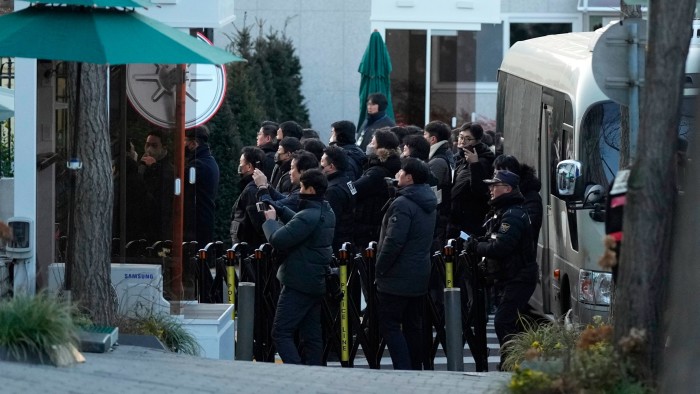Unlock the Editor’s Digest for free
Roula Khalaf, Editor of the FT, selects her favourite stories in this weekly newsletter.
South Korean investigators are attempting to arrest President Yoon Suk Yeol as part of a probe into alleged treason and abuse of power after his failed gambit last month to impose martial law.
Investigators from the Corruption Investigation Office for High-ranking Officials and police officers passed a military unit guarding Yoon’s compound in central Seoul early on Friday and are at his residence, said the defence ministry.
But the head of the Presidential Security Service was not allowing them to search Yoon’s residence, according to state news agency Yonhap. The defence ministry declined to comment on the stand-off. Yoon’s lawyers called the arrest attempt “illegal and invalid” and said they would take legal action against the move.
Hundreds of Yoon’s supporters rallied outside his residence, shouting “impeachment invalid” and “protect Yoon”. If arrested, Yoon will be the first incumbent South Korean president to be detained.
Yoon unleashed an acute political crisis in South Korea with his failed effort to impose martial law. He was impeached by parliament last month, but the move has to be approved by the country’s Constitutional Court.
The independent anti-corruption agency wants to question Yoon over possible insurrection after he allegedly dispatched troops to the National Assembly in an attempt to prevent lawmakers from rejecting his shortlived martial law decree.
A court issued the arrest warrant this week after Yoon refused to answer repeated summons for questioning. If arrested, he will be questioned by investigators and stay at a detention centre for two days before the anti-corruption agency either releases him or charges him for treason.
Analysts have urged acting president Choi Sang-mok to take action to end the stand-off. “As the acting commander-in-chief, Choi should step forward to resolve the situation,” said Shin Yul, a professor of politics at Myongji University in Seoul.
The “law should apply equally to everyone”, said Lee Jae-myung, leader of the opposition Democratic party, on Friday. “Not all people should be sacrificed because of someone’s egotism or a group’s special interests.”
Under South Korea’s constitution, the president is immune from criminal prosecution, except when facing allegations of rebellion or treason.
The Constitutional Court’s eight sitting justices will hold a second hearing on Friday on whether to remove Yoon from office. The court has until June to reach a verdict, though this deadline can be extended. A minimum six votes are required to approve Yoon’s impeachment. If he is removed from office, a presidential election must be held within 60 days.
The political turmoil has weighed on South Korea’s economy, which is facing the prospect of higher US tariffs from Donald Trump’s second term in the White House. The government on Thursday revised down this year’s growth forecast to 1.8 per cent from 2.2 per cent and is considering drawing up an extra budget to boost sluggish domestic consumption.
Choi on Friday ordered officials to take measures to stabilise financial markets “swiftly and boldly” in case of heightened volatility.
He said he would continue to meet high-ranking financial officials including Bank of Korea governor Rhee Chang-yong every week to monitor market conditions. Rhee on Thursday warned of growing downside risks for the South Korean economy and said the bank would be “flexible” with the pace of interest rate cuts in the face of “unprecedented” political and economic uncertainties.
South Korea’s stocks and currency were among the worst performers in Asia last year, in part because of the political chaos, with the Kospi stock index down nearly 10 per cent and the won trading near its lowest level since 2009. The Kospi was trading up 1. 7 per cent on Friday morning.


